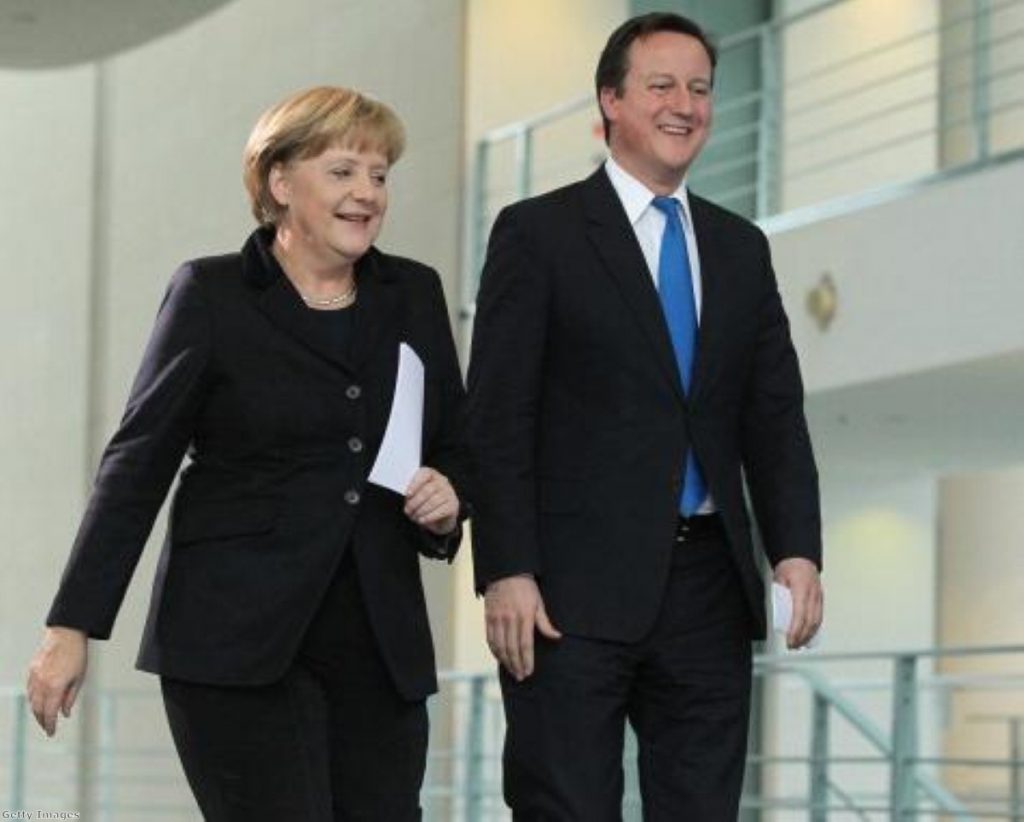The embarrassing link between Cameron and Germany’s anti-Islam movement
By Edward McMillan-Scott
When Angela Merkel meets David Cameron in London today, one topic could cause embarrassment to both leaders: Cameron's association with the German anti-Islamist movement, Pegida (Patriotic Europeans Against the Islamisation of the West), which was condemned at the New Year by the German chancellor.
After the European election in May, Cameron's controversial group in the European parliament voted to include Germany's Eurosceptic Alternative für Deutschland (AfD) MEPs, a move which infuriated Merkel, especially now that AfD has become the political mouthpiece of Pegida.
This Monday night saw the most widespread demonstrations, both for and against Pegida, with some public buildings dimmed to register dislike of it. But on Wednesday, as Merkel meets Cameron, one of AfD's co-chairs, Frauke Petry, will hold talks with a view to a merger with Pegida, just as some Conservatives are urging Cameron to do a deal with Nigel Farage.


Indeed, the architect of Cameron's EU grouping, the anti-EU Dan Hannan MEP, has repeatedly urged such a merger in his now-defunct Daily Telegraph blog.

Merkel is visiting the UK ahead of a G7 meeting in Bavaria
In a commentary for Deutsche Welle, Volker Wagener said:
"The AfD adopts the role of Pegida's mentor – it is the parliamentary voice of the street, carrying street protests into German parliaments. This alliance has consequences. At the moment, the much-heralded mainstream of society is palpably drifting rightward – across generations, across education levels."
But, as Kate Connolly wrote in The Observer on Sunday:
"Merkel, who has previously warned Pegida followers against allowing themselves to be manipulated by the organisers, with remarks that seemed like thinly veiled references to the Pied Piper of Hamelin, was also full of condemnation for their misuse of the slogan 'Wir sind das Volk' (We are the people). The phrase was adopted by East German anti-communist demonstrators in the run-up to the fall of the Berlin Wall, and now punctuates Pegida rallies at regular intervals.
"For Merkel, who spent the first 35 years of her life under communism, far from being an expression of the wish to unite, as it was in 1989, the phrase was now being used to divide. 'What they really mean is 'you are not one of us', because of your skin colour or your religion,' she said.
"The precipitous rise of Pegida has shaken Germany's main parties to the core and prompted an acrimonious debate at a time when Europe's biggest economy is straining to deal with a record intake of more than 200,000 asylum seekers in 2014 – mainly from Iraq and Syria – a figure higher than any other country in Europe and which is due to rise considerably this year."
The benign outcome of the fall of the Berlin Wall, when democracy and human rights, the rule of law, a free media and free markets spread across the former Soviet bloc, is being overshadowed by the rise of a new extremism with echoes of the thirties. The risk of Greek exit from the euro epitomises a familiar malaise of high unemployment, political and economic instability and apparently strong leaders, like Putin, who are admired by Farage and many others from the edges of politics.

A rising euroscepticism is challenging the European project
It is time for the EU to rediscover and reanimate the values which gave the darker half of Europe its freedom 25 years ago, through programmes like the EU's €160 million Democracy and Human Rights Instrument which I founded in 1990, but which is at present operational only outside the EU.
The risk for us is that Cameron's European political adventure with the wilder shores of politics undermines his capacity to speak for Britain with the continent's most significant leader, chancellor Merkel.
Edward McMillan-Scott was MEP for Yorkshire & Humber 1984 -2014 and European parliament vice-president for democracy & human rights.
The opinions in Politics.co.uk's Comment and Analysis section are those of the author and are no reflection of the views of the website or its owners.

